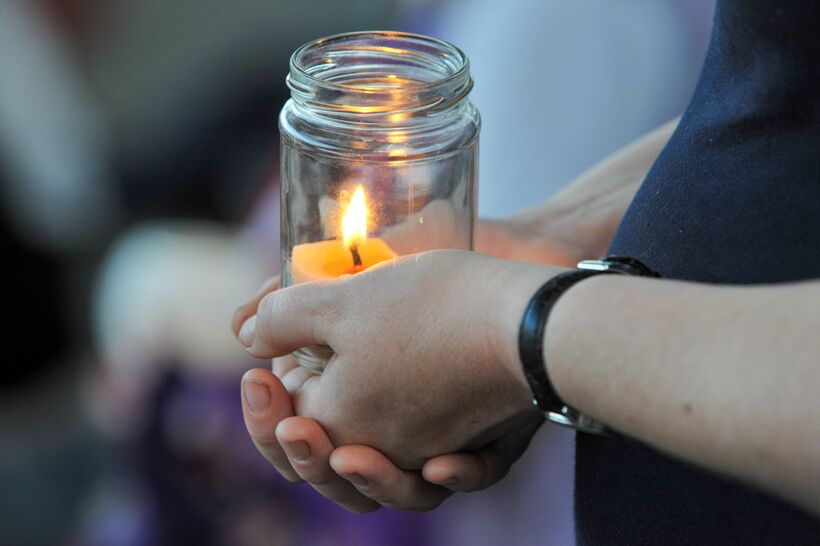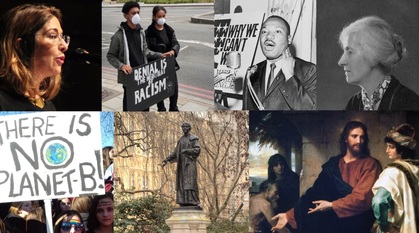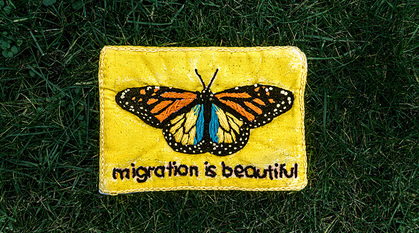The fragility of freedom: Holocaust Memorial Day 2024
Oliver Robertson reflects on the theme of this year's Holocaust Memorial Day and what it calls us to do to prevent genocide in the world today.

Quakers, like many others, participate in Holocaust Memorial Day (HMD) each year. Taking place on 27 January (the anniversary of the liberation of the Auschwitz-Birkenau concentration camp), it's a critical reminder of how division and hatred can spread, and to reinforce our commitment to prevent that.
For those who haven't taken part, either at local events or nationally, then there's an opportunity to watch extracts from the main ceremony online. That's what I'll be doing, and even at home on a computer it is a powerful, emotional experience. The best explanation of human rights I've heard in the last five years was at HMD: they were created to ensure that the dehumanisation and inhumanity of the Holocaust could never happen again.
A reminder of shared humanity
“Look how that turned out", you might say, with at least another four genocides having taken place in the years since – in Cambodia, Rwanda (30 years ago this year), Bosnia and Darfur. But good ideas are still good ideas, even if people don't always follow them, and anything that reminds us of our shared humanity should be celebrated and upheld. Indeed, it's particularly needed at times when those values seem under threat.
The theme of this year's HMD is 'the fragility of freedom'. There are many ways in which the freedoms of people are restricted, both those at risk of persecution and genocide, and also the rest of the population, to prevent challenge.
Of course, a bit like you don't have every illness for which you've got a symptom, not every restriction of freedom around the world will (if unchecked) lead to genocide. But it's a path we shouldn't want to go even one step down, given how terrible the end of that path is.
Action for a safer future
The Holocaust Memorial Day Trust reminds us that HMD is not only about remembrance, but also about taking action to create a safer future. One of the resources promoted by HMD is a '10 steps of genocide' guide, produced by Genocide Watch. This organisation, which to my shame I hadn't heard about before engaging with HMD 2024, also has a list of 'genocide alerts', the countries and situations where a genocide is at risk of occurring, and which of those 10 steps are happening. If you click on one link from this blog, click on that. There are conflicts and persecutions that I was unaware of, and details of known conflicts that I hadn't realised. Given that Quakers work for peace, we should know about the places where peace may be furthest away, and to direct our Light, prayers and possibly actions there.
Some of the countries listed by Genocide Watch may come as a surprise. The UK is currently on the 'watch list', the lowest level of alert, meaning there are signs of the early stages of the genocidal process. It cites the words and actions of the government and far-right politicians in promoting dehumanisation, discrimination and polarisation in our country. Quakers in Britain recognise the importance of challenging these early stages of the genocide process and are actively working on this, directly and by supporting others.
Genocide emergency
The highest and most severe level of alert is that of 'genocide emergency' where a situation has reached what the organisation calls "the stage of genocidal massacres and other acts of genocide". The most recent situation to be placed in this category is the Israel-Hamas war, with Genocide Watch citing acts committed by both Hamas and Israel. I have thought long and hard about whether to mention this in a blog about Holocaust Memorial Day, because it is particularly hurtful to many Jews, and particularly problematic to invoke or connect to the Holocaust when describing human rights abuses against Palestinians. Doing so is often antisemitic, and always inflammatory.
So what can we do, as Quakers, when we see violence or hate? One way has been by working where welcomed to accompany those affected by extreme violence. For many years British Quakers, for example, accompanied local peacebuilders in Bosnia, Croatia, and Serbia. And because of our historic connection to other churches and the Quaker community in the West Bank, Quakers today do what we can to support affected communities there too.
This includes sending people to accompany populations in Israel and the West Bank (not Gaza) and report on their experiences: these can be read over at eyewitness blogs along with actions that Friends can take to help bring the violence to an end. As with any account of individuals' lives, the eyewitness blogs can help to humanise cases that would otherwise be distant, and bring into focus that these too are children of God.
Connecting with people, whether personally or by reading their stories, helps us to avoid seeing them as 'other'. It steers us away from the first of the steps towards genocide, taking a tiny step towards a world where genocide is a thing of the past.


